Billingsgate Market – an early morning visit with festive breakfast
Fish… a sensitive subject for me, right? For all of those who have known me for sometime, it is clear that I am somehow interested in the fishing issues, or rather, overfishing, quotas, species, locations, methods and all that. After years supporting charities such as Marine Conservation Society and Bite Back, I simply cannot keep quiet and I will brain wash anyone who will listen about the issues I am so passionate about.
So a visit to Billingsgate Fish Market was always going to be a bit of a challenging experience, yet I had never been there and and wanted to see with my own eyes what it was about.
Billingsgate Fish Market, located in east London, is the United Kingdom’s largest inland fish market. An average of 25,000 tonnes of seafood products are sold through its merchants each year. The Market complex covers an area of 13 acres and is entirely self-contained. The ground floor of the building comprises a large trading hall with 98 stands and 30 shops
On a very wet and cold November morning I arrived at the market at 6.45am, in pitch black. Riding through the city and then Canary Wharf was, despite the weather, actually pleasant with no traffic, no cyclists and empty roads. Billingsgate car park however, was already a flurry of activity. I made my way to the huge complex, and looked for the Billingsgate Seafood Training School (upstairs) where our morning visit was due to start.
The first thing I spotted in the room was, amongst a few flyers, the Marine Conservation Society’s “Good Fish Guide”, a great start for sure. We then met Barry, a fish expert from the Fishmongers Company and followed him in the market downstairs where our tour actually begun.
After a quick overview of the market itself, he told us that, every day, there around 200 species of fish and shellfish available, coming in from all corners of the world, or rather, the oceans.
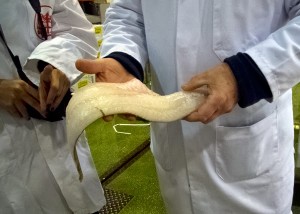 |
| Barry showing us how to recognise freshness in trout (top) and cod. |
Every seller is thoroughly controlled and species must follow guidelines, specifically on quotas, fishing methods and areas of catch. Unfortunately I cannot read anything around this on the market’s official website so let’s hope that is all true!
Within two days max of being caught, the fish is available for sale at the market and inspectors check each fish box each morning and if it is of poor quality or not good for sale, the box gets a big red no no and it’s forbidden to put it on sale. Quality is of the utmost importance for the market and the local authority.
The market opens at 4am for trade but trucks come in through the night, arriving around 10pm to offload their catches. By 8am everyone leaves and the market is scrubbed clean. Prices at the market are way lower than in retailers outside eg supermarkets, and buying a box of cod is incredibly cheap at around £30.
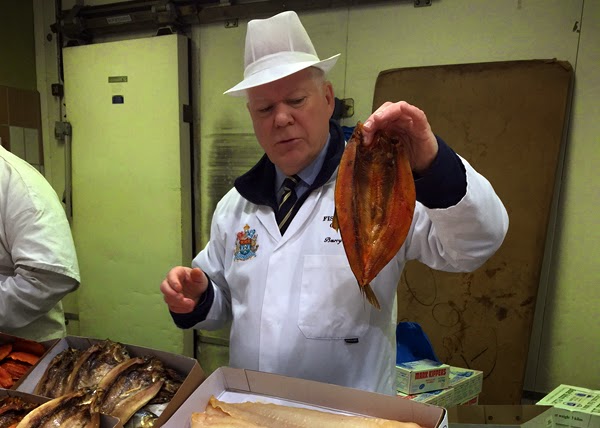 |
| Smoked options: from kippers to cod |
For sale in the market are also other fish industry products. Barry showed us around a smoked fish shop, where we tasted some fantastic produce. He taught us what to look for in smoked fish, for example a translucent sheen which means the smoking has been happening slowly on the surface. Hake is becoming popular amongst the smoked fish, while smoked eel is the most expensive fish at £35 per kilo! Some of us were also brave enough (it was only early morning after all!) to try jellied eels and actually it’s not that bad…
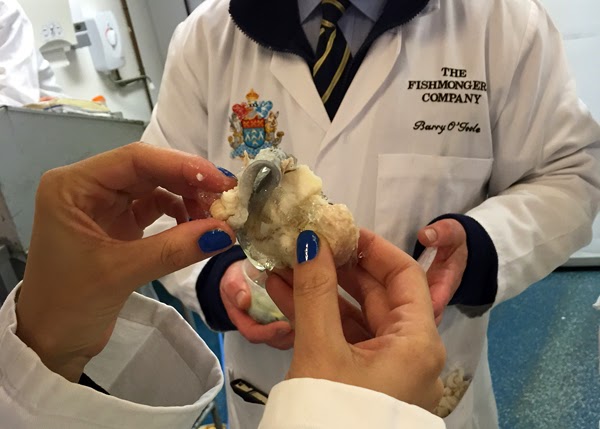 |
| Jellied eels |
At the market there are a few sellers who import fish from oceans other than the Atlantic. Here was the most challenging part of the tour for me, having just returned from the Indian Ocean where I saw plenty of beautiful fish happily swimming by… Seeing a flying fish for sale at a Sri Lankan stand was quite peculiar. Yet it was when Barry pulled our a meter long bleeding and very dead shark from a box that my heart really sank. I was prepared, I was expecting it but it did not make it any less upsetting, yet not all sharks are listed as endangered and therefore their sale and their consumption is still very much legal, sadly.
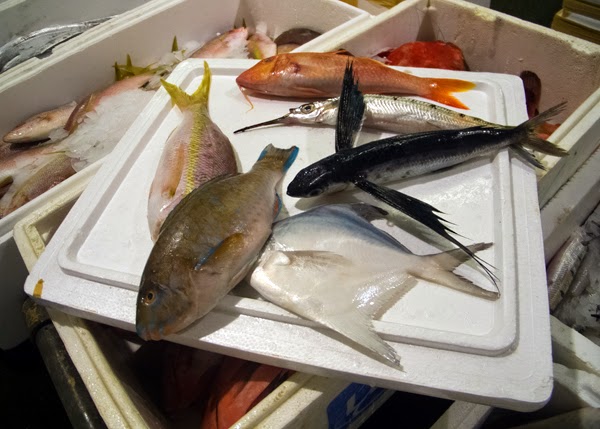 |
| Flying fish, parrot fish, needle fish. |
We finally stopped by a shell fish retailer, with plenty of cheap, fresh and beautiful oysters (50p each) and hand dived scallops amongst other things and then the writhing, live eels drawers.
After about an hour, our tour of the market was over and it was time to go upstairs for a brief cooking demo held at the School by CJ Jackson, the school’s CEO. We missed a fair bit as we were way too fascinated by Barry’s words and stayed behind in the market itself, but the demo was all about how to make your Christmas Menu more festive and use the products for sale at the market such as salmon and haddock. The school regularly run a wide variety of fish cooking classes, not only during the day but weekends and evenings as well.
We enjoyed breakfast at the school just as the first light of the day was coming up. Scrambled eggs and salmon on toast, coffee by Little’s and a glass of Frerejean Frere Champagne.
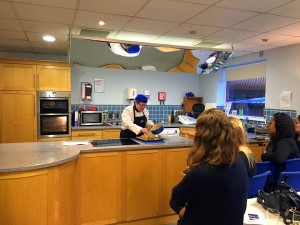 |
| Demo in full swing |
“The school is established as a charitable company, with the aim of promoting the awareness of fish to young people. By establishing the school at Billingsgate, those attending the courses will gain the best knowledge of all the different types of fish and fish products on offer.”
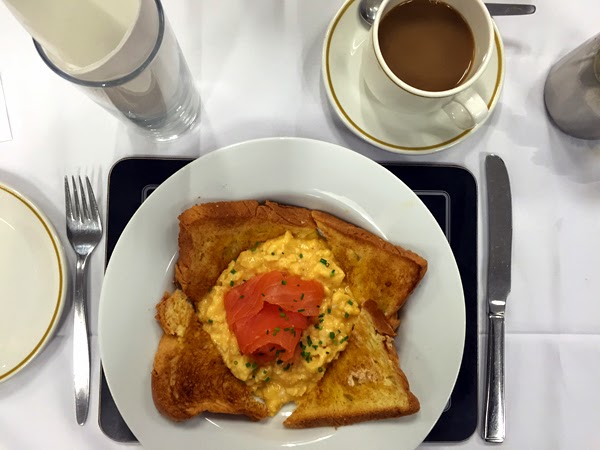 |
| Festive Breakfast (top) demo and table |
Billingsgate special breakfast events will run in the mornings from Thursday 13th November to Friday the 19th of December on Wednesday, Thursday and Friday mornings from 8am
(6.45am with the guided market visit)
Breakfasts cost £35 per person (£45 including market tour). CJ and her team will also offer to source and prepare the fish listed in the recipes for convenient pre-Christmas collection, taking all the hassle out of hosting come December.
Personally, I think £35 is a little expensive but I found the market visit extremely enjoyable and the most valuable part of the morning: it was fascinating and of course, a little hard to see some of the fish on offer, but on the other hand, the quality of the produce is stunning. Barry was friendly, fun and his knowledge of the fish variety extensive.
Well worth an early rise!
Some more photos from the market:

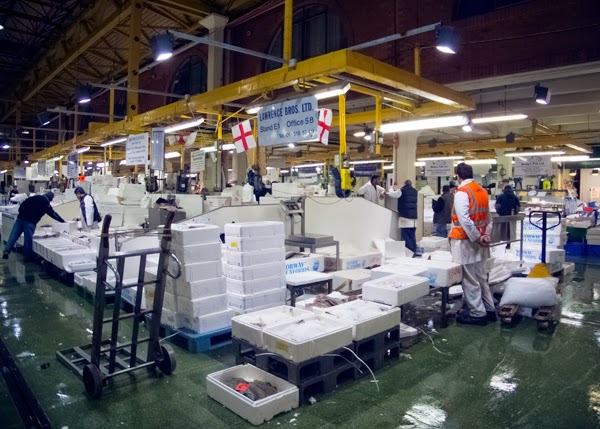
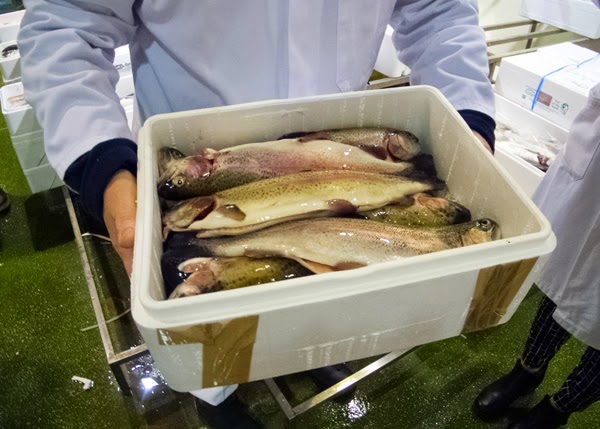
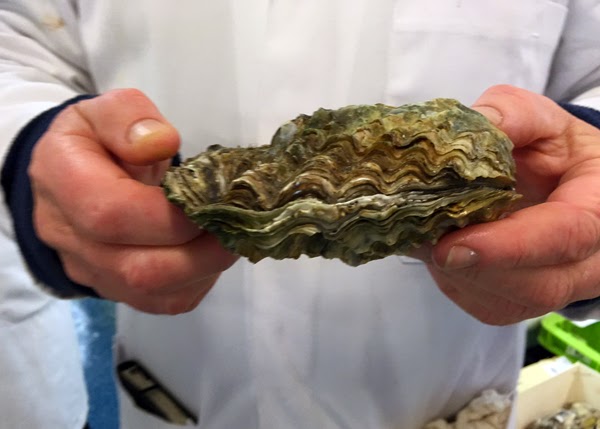
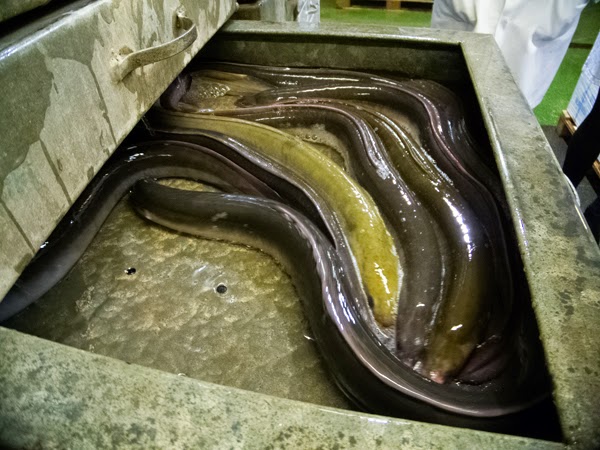
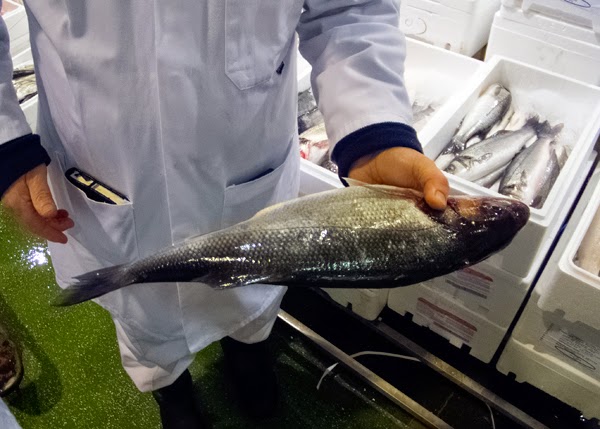
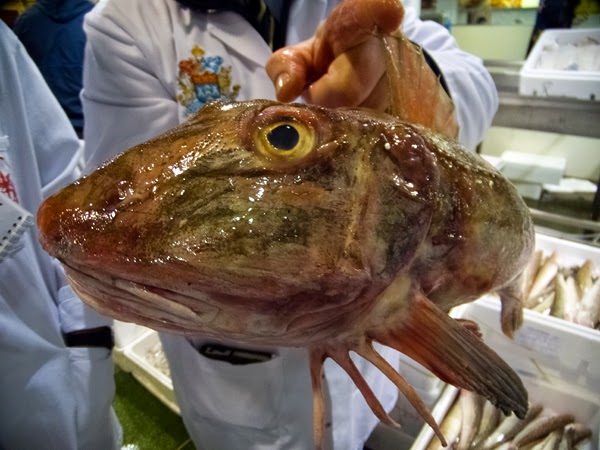
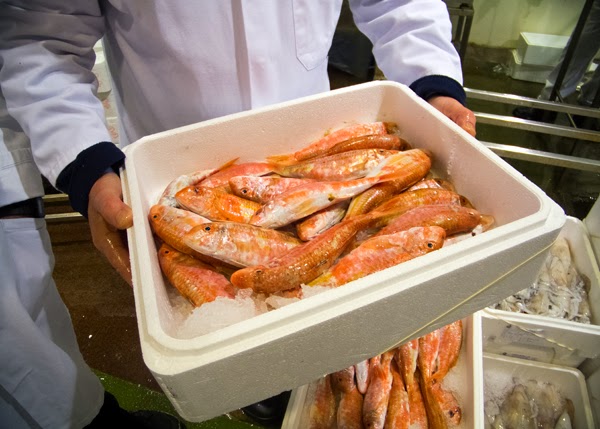
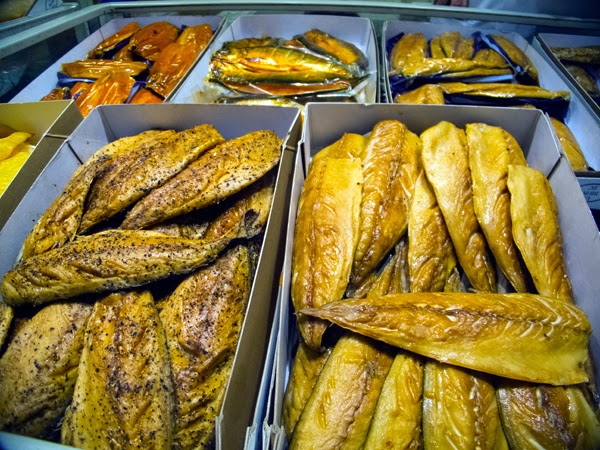
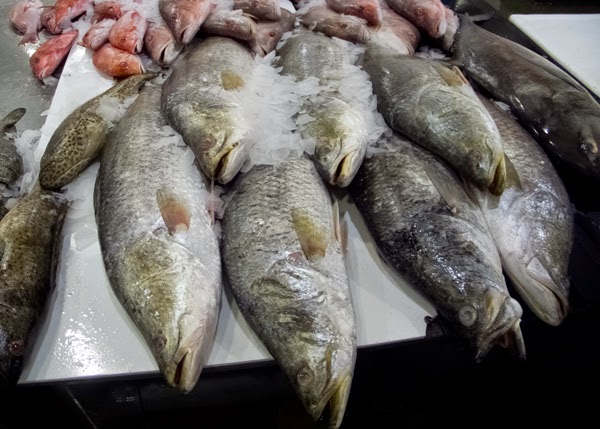
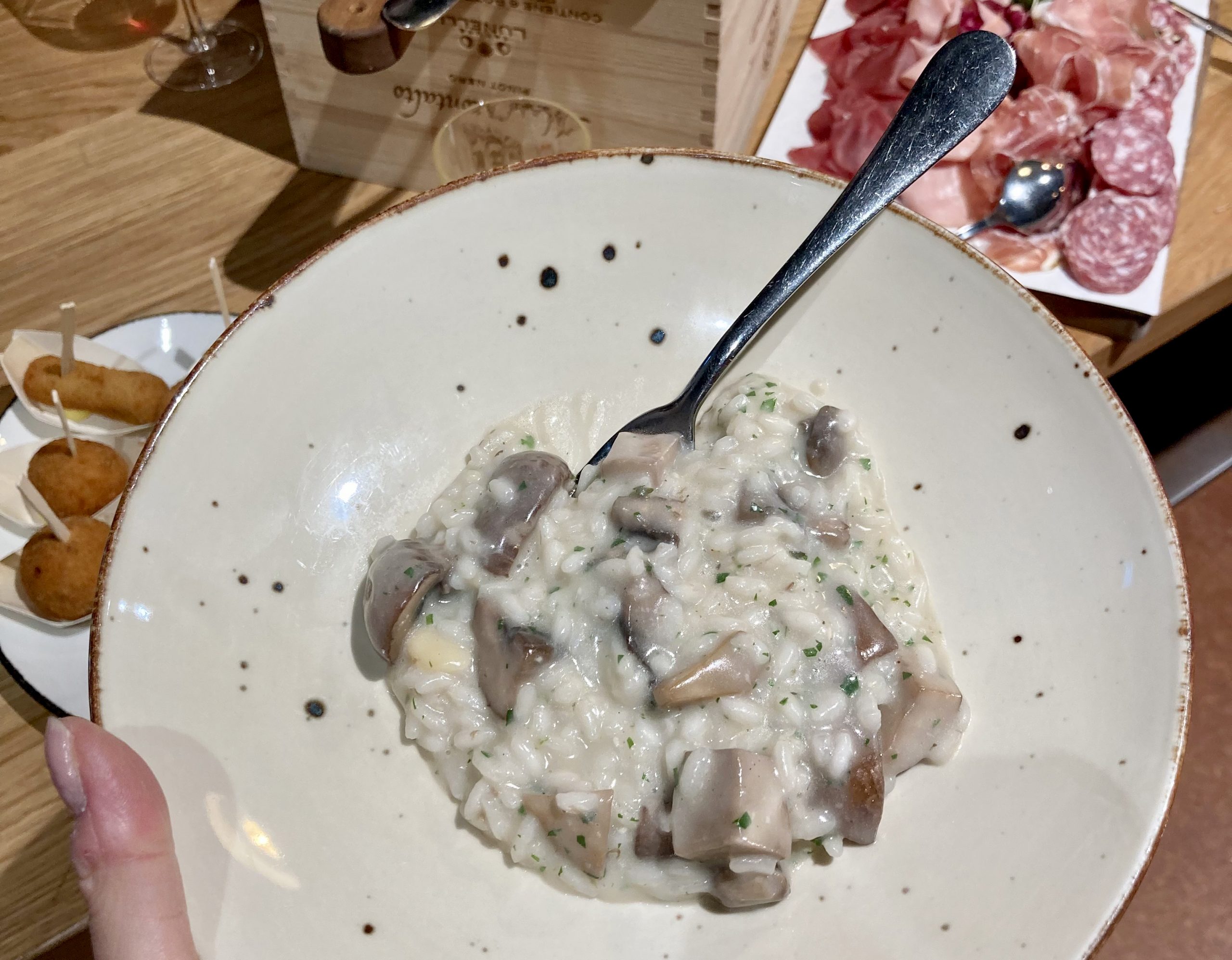
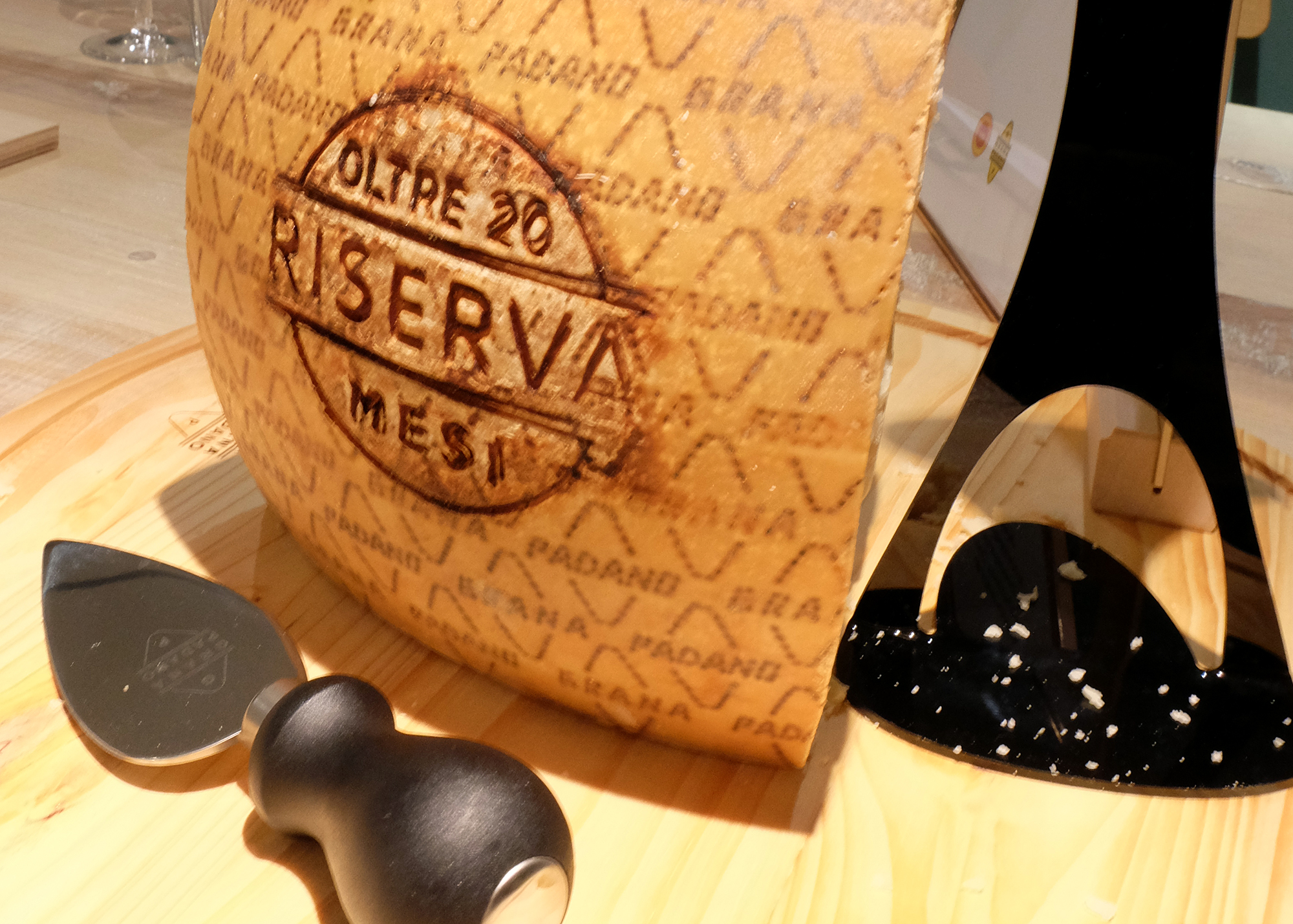
Molto interessante!
Prima o poi riusciro’ ad andare al mercato del pesce di Tokyo anche se immagino che sara’ uno shock!
Eh si… immagino davvero di si. Ora vorrei fare la visita al mercato della carne di Smithfield’s!